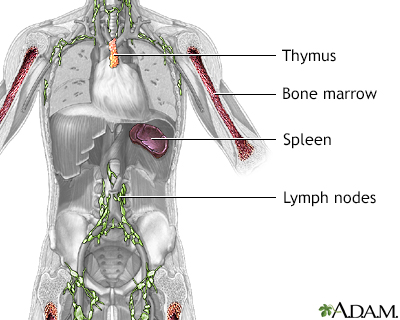Chemotherapy
Cancer chemotherapy; Cancer drug therapy; Cytotoxic chemotherapy
The term chemotherapy is used to describe cancer-killing drugs. Chemotherapy may be used to:
- Cure the cancer
- Shrink the cancer
- Prevent the cancer from spreading
- Relieve symptoms the cancer may be causing
Images

I Would Like to Learn About:
Information
HOW CHEMOTHERAPY IS GIVEN
Depending on the type of cancer and where it is found, chemotherapy medicines may be given different ways, including:
- Injections or shots into the muscles
- Injections or shots under the skin
- Into an artery
- Into a vein (intravenous, or IV)
- Pills taken by mouth
- Shots into the fluid around the spinal cord or brain
When chemotherapy is given over a longer period, a thin catheter can be placed into a large vein near the heart. This is called a central line. The catheter is placed during a minor surgery.
There are many types of catheters, including:
- Central venous catheter
- Central venous catheter with a port
- Percutaneously inserted central catheter (PICC)
A central line can stay in the body over a long period of time. It will need to be flushed on a periodic basis to prevent blood clots from forming inside the central line.
Different chemotherapy medicines may be given at the same time or after each other. Radiation therapy may be received before, after, or during chemotherapy.
Chemotherapy is most often given in cycles. These cycles may last 1 day, several days, or a few weeks or more. There will usually be a rest period when no chemotherapy is given between each cycle. A rest period may last for days, weeks, or months. This allows the body and blood counts to recover before the next dose.
Often, chemotherapy is given at a special clinic or at the hospital.
DIFFERENT TYPES OF CHEMOTHERAPY
The different types of chemotherapy include:
- Standard chemotherapy, which works by killing cancer cells and some normal cells.
-
Targeted therapy, which targets a specific part of cancer cells.
-
Immunotherapy, which uses the immune system to attack cancer cells.
SIDE EFFECTS OF CHEMOTHERAPY
Because these medicines travel through the blood to the entire body, chemotherapy is described as a bodywide treatment.
As a result, chemotherapy may damage or kill some normal cells. These include bone marrow cells, hair follicles, and cells in the lining of the mouth and the digestive tract.
When this damage occurs, there can be side effects. Some people who receive chemotherapy:
- Are more likely to have infections
- Become tired more easily
- Feel pain or numbness from nerve damage
- Have a dry mouth, mouth sores, or swelling in the mouth
- Have a poor appetite or lose weight
- Have an upset stomach, vomiting, or diarrhea
- Lose their hair
- Have problems with thinking and memory ("chemo brain")
Side effects of chemotherapy depend on many things, including the type of cancer and which drugs are being used. Each person reacts differently to these drugs. Some newer chemotherapy drugs that better target cancer cells may cause fewer or different side effects.
Your health care provider will explain what you can do at home to prevent or treat side effects. These measures include:
- Being careful with pets and other animals to avoid catching infections from them
- Eating enough calories and protein to keep your weight up
- Preventing bleeding, and what to do if bleeding occurs
- Eating and drinking safely
- Washing your hands often with soap and water
You will need to have follow-up visits with your provider during and after chemotherapy. Blood tests and imaging tests, such as x-rays, MRI, CT, or PET scans will be done to:
- Monitor how well the chemotherapy is working
- Watch for damage to the heart, lungs, kidneys, blood, and other parts of the body
Related Information
Chemotherapy - what to ask your doctorAfter chemotherapy - discharge
References
Collins JM. Cancer pharmacology. In: Niederhuber JE, Armitage JO, Kastan MB, Doroshow JH, Tepper JE, eds. Abeloff's Clinical Oncology. 6th ed. Philadelphia, PA: Elsevier; 2020:chap 25.
Doroshow JH. Approach to the patient with cancer. In: Goldman L, Cooney K, eds. Goldman-Cecil Medicine. 27th ed. Philadelphia, PA: Elsevier; 2024:chap 164.
National Cancer Institute website. Chemotherapy to treat cancer. www.cancer.gov/about-cancer/treatment/types/chemotherapy. Updated August 23, 2022. Accessed June 18, 2024.
BACK TO TOPReview Date: 6/17/2024
Reviewed By: Todd Gersten, MD, Hematology/Oncology, Florida Cancer Specialists & Research Institute, Wellington, FL. Review provided by VeriMed Healthcare Network. Also reviewed by David C. Dugdale, MD, Medical Director, Brenda Conaway, Editorial Director, and the A.D.A.M. Editorial team.

Health Content Provider
06/01/2025
|
A.D.A.M., Inc. is accredited by URAC, for Health Content Provider (www.urac.org). URAC's accreditation program is an independent audit to verify that A.D.A.M. follows rigorous standards of quality and accountability. A.D.A.M. is among the first to achieve this important distinction for online health information and services. Learn more about A.D.A.M.'s editorial policy, editorial process and privacy policy. A.D.A.M. is also a founding member of Hi-Ethics. This site complied with the HONcode standard for trustworthy health information from 1995 to 2022, after which HON (Health On the Net, a not-for-profit organization that promoted transparent and reliable health information online) was discontinued. |
The information provided herein should not be used during any medical emergency or for the diagnosis or treatment of any medical condition. A licensed medical professional should be consulted for diagnosis and treatment of any and all medical conditions. Links to other sites are provided for information only -- they do not constitute endorsements of those other sites. © 1997- 2025 A.D.A.M., a business unit of Ebix, Inc. Any duplication or distribution of the information contained herein is strictly prohibited.
